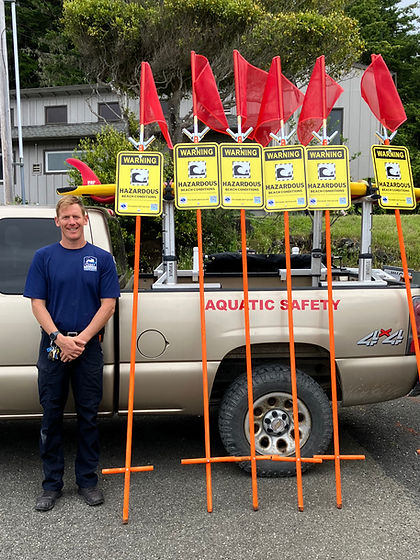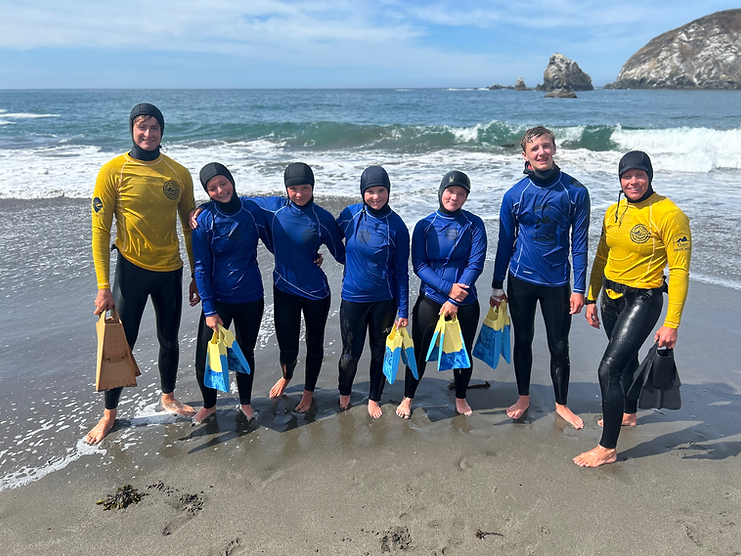
Guardians of the Coastline
All year long, our Aquatic Safety Lifeguards stand watch over the breathtaking—and powerful—beaches of Oregon’s Wild Rivers Coast. More than lifeguards, these highly trained professionals serve as first responders, safety educators, and stewards of our shoreline. Their goal is to emphasize preventative measures and vigilance because in some life-or-death scenarios lifeguards could be close to 100 miles away. Whether you're dipping your toes in the surf, chasing sunsets along the sand, or navigating our 500+ miles of waterways (including rivers and streams), our Aquatic Safety Managers are here to help you enjoy the coast safely and responsibly.

Oregon's Wild Rivers Coast Lifeguards
Curry County’s Aquatic Safety Lifeguard is a small, highly trained group of open-water lifeguards and educators dedicated to helping everyone enjoy our oceans, rivers, and bays safely. They share local hazard updates, teach water safety in schools, and lead a hands-on Junior Lifeguard program for youth ages 9–17—building ocean awareness and lifesaving skills through activities like open-water swimming, paddling, and rescue basics. Certified in surf/ocean rescue, first aid, and CPR, the team partners closely with county emergency management and regional agencies to promote safe recreation across Oregon’s Wild Rivers Coast waterways.

Luke Martinez
Curry County Aquatic
Safety Manager

Declan Debler
Curry County Aquatic
Safety Intern

Dangers Along the Waterways
On Oregon’s Wild Rivers Coast, beauty comes with power. Our waterways—including the Rogue, Chetco, Elk, and Sixes—can change quickly: cold water, rapid currents, shifting channels, and hidden hazards like logjams, undercut banks, and slippery rocks are common. Along the shore and at river mouths, be alert for sneaker waves, rip currents, and surging tides around jetties and tide pools. Check conditions, keep kids within arm’s reach, and wear a life jacket near rivers or on the bay—respect the water, and you’ll make safer memories. Life jackets are legally required for children 12 and under, and for everyone on class 3 whitewater rapids or above
Three Rules to Live by on the Beach!


What to do in an Emergency!
1. If you see someone in distress.
If someone is in trouble, call 911 immediately and give clear location details (beach access number, nearest landmark/trailhead, or GPS; name the waterbody like the Rogue, Chetco, Elk, or Sixes). Keep your eyes on the person and assign someone to meet rescuers. Don’t enter the water unless you’re trained and equipped use “reach or throw, don’t go”: extend a stick or leash, or throw a life jacket, rope, or anything that floats.
2. You find yourself in a rip current (or find yourself in the ocean)
If you are caught in a rip current, float to conserve energy, signal for help, and swim parallel to shore only if you’re able.
3. You find yourself in a river
In rivers, float on your back with feet up, point downstream, and work toward calm water or the bank. After rescue, treat for cold exposure: remove wet clothing, warm the person, and wait for EMS. Follow posted warnings and lifeguard instructions at all times.

Junior Lifeguards Program
The Junior Lifeguard Program is instructed by certified open water lifeguards, teaching youth ages 9-17 ocean safety awareness and lifesaving skills and focusing on improving open water swimming, board, and paddling skills. This program is the first and only open water junior lifeguard program in the State of Oregon. Its focus instills in youth the importance of hard work and dedication, helping mold our future first responders and community leaders. The program currently hosts three sessions during the summer months at Sunset Bay State Park in Coos Bay, OR; Battle Rock and Port Beach State Park in Port Orford, OR; and Harris Beach State Park in Brookings, OR. It’s a wonderful day to be a junior lifeguard!

Check Out Our Junior Lifeguards!
Know BEFORE YOU GO!



Curry County Aquatic Safety/ Lifeguard Interest Form
Our recruitment process is not active at this time. However, you are welcome to complete this interest card for our records. Once we have this application on file, we can provide you with better assistance during the hiring and testing processes.
Program funded by these generous partners!



